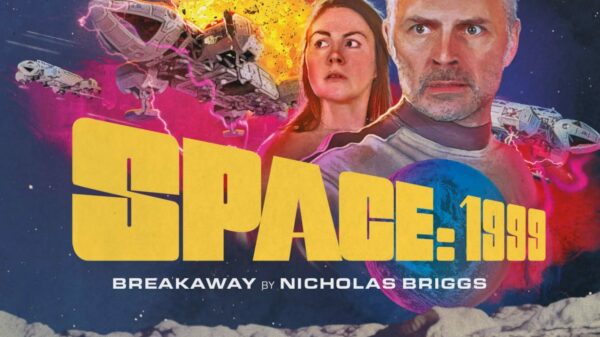The latest 1970s genre property to receive the Big Finish audio makeover treatment is the hugely fondly remembered interstellar epic Space: 1999 – the opening episode of which is retold here infused with a strong contemporary ethos and tone that remains respectful but not reverential to the original source material.
The second live action series created by Gerry and Sylvia Anderson (following the success of UFO), Space: 1999 debuted on the ITV network in 1975. The show took the familiar genre premise of a “wagon train in space”, but replaced the traditional spaceship with the idea that the Earth’s moon could be ripped from its orbit and flung into the far reaches of space complete with its shell-shocked human crew. These unwilling space nomads encountered anomalies and aliens aplenty in the 23-episode flight across the cosmos that followed the memorable pilot.
Reception for the series was mixed, with critics, viewers (and some of the show’s own backers) seemingly impressed and disappointed in equal numbers. After being revived from summary cancellation, a second (and heavily reworked) series followed in 1976, which divided opinions still further with its frequently outlandish guest characters and oddly metaphysical plots.
Tonal shift
The Andersons always intended that the show would be crafted to appeal to a younger audience and project a family-friendly brand. What’s immediately evident from Nicholas Briggs’ thoughtful and cleverly constructed script, is that while Big Finish are keen to retain the signature elements that made the series so effective as an explosive space adventure, there’s a tonal shift in the storytelling. In the case of Survivors, or The Omega Factor or even The Prisoner, Big Finish have been able to translate the emotional and psychological texture of those televisual environments directly to the audio realm. But things have been done differently here, and for all the right reasons.
As a result, the character dynamics on Moonbase Alpha are not as they once were. No longer a place governed by a traditional deferential pecking order, power and control are now contested things in the Command Centre; and there’s a great deal of drama to come out of that, as the team of lunar explorers clash and argue about the best course of action as their situation becomes ever more perilous.
To underpin that more collaborative dynamic amongst the lunar crew, the personalities of key players have been tweaked too. Vocal performances are really strong from everyone. It’s right that none of the cast attempt an impersonation (and, as their characters’ natures have been revised, that wouldn’t have worked in any case).
Key players
In the original series, Victor Bergman (Barry Morse) was the personification of an avuncular scientific adviser and a kind of wise-old grandee of space command. Clive Hayward plays Bergman as a more driven, energetic and professional specialist. Many viewers will recall Barbara Bain’s distinctive performance as an “emotionally restrained” Dr Helena Russell on TV. Maria Teresa Creasey’s Russell is a more feisty, animated and impassioned physician, ready and willing to challenge authority and speak her mind, but possessed of a first-rate bedside manner.
Commander Koenig, played with conviction and gravitas by Martin Landau in the 1970s is brought to life on audio through a terrific turn by Mark Bonnar. His Koenig is a more connected and engaged leader, able to motivate and inspire his team from amongst their ranks without needing to adopt the style of the patrician or the patriarch. Together with the updated gender politics of the piece, this makes the interactions of the crew unfold in what feels like a very contemporary way.
There’s a pretty large cast to handle, and to share out sufficient plotlines and dialogue among, but with the original plan for an hour drama all but doubled, there’s sufficient space for Briggs to establish things very convincingly. The script replays key plot elements from the original TV pilot, but reworks several elements, with Briggs concerned to refashion the improbable physics of the moon’s expulsion from its orbit into something no less “fantastical” but much more in keeping.
Source material
Sound design by Iain Meadows is exceptional throughout and, given how iconic the visuals and the model work of the original show were, it needs to be – to conjure up the sense of place and the foreshadowing of disaster. Benji Clifford’s accomplished reworking of the original score gives it extra punch and a greater sense of sharpness and of impact.
Released on 13 September 2019, twenty years to the day since “the event” was supposed to have happened (at least in the imagination of George Bellak, when putting his TV script for “Breakaway” together in 1975), this retelling of the series’ opener establishes a firm lunar platform from which to launch future adventures.
If this “Breakaway” turns out to be (just as it was on TV) an episode like none other in the series that follows, it still succeeds in setting in motion not just the moon itself but the relationships between the occupants of this astronomical body hurtling through space. Briggs is obviously keen to pay homage to the source material, and there’s every reason for fans of the original to enjoy this updated evocation. But there’s more here to excite than simple nostalgia: there are intriguing new possibilities too.
There’s every indication that future audios will unfold in the more conducive world of the cerebral and serious sci-fi of Space 1999‘s first TV series rather than amidst the garish monster romps and existential hokum of series two. And going on the evidence of this very first blast into deep space, it’s safe to say that this moon rocks.
Space: 1999 – Breakaway is available to purchase from the Big Finish site.
![]()

